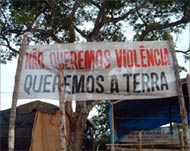Brazil’s timber mafias kill with impunity
Jungle-trained troops have begun arriving in Brazil’s Amazon as the government attempts to stop violence from spiralling out of control following the assassination of US missionary nun Dorothy Stang.

Stang, 74, was killed in a volley of six shots in the early morning of 12 February in the town of Anapu. Her death marks the most high-profile murder in the region since rubber-tapper campaigner Chico Mendes was killed in 1988.
As the first of 2000 troops flew into the northern state of Para, the National Pastoral Commission, CPT, made public a hit list of more than 160 people it had registered as receiving death threats, including bishops, priests and church workers.
Stang’s had been included on the list as of 9 January.
Forty of the names were concentrated in Para, a state the size of France and Spain combined. Since Stang’s death, a union activist and two workers have been gunned down.
The violence stems from illegal loggers, modern-day slave owners and ranchers protecting their interests against poor farmers, ecologists, human-rights activists and trade unionists.
At the centre of the current wave is the battle for the control of the Terra do Meio, a disputed area of virtually untouched forest stretching for nine million hectares.
Strong reaction
Justice minister Marcio Thomasz Bastos, who first met Stang at the trial of the killers of Chico Mendes, said her murder was a “strong reaction” to the government’s intention to create a protected area in the region “from people who are not accustomed with democracy and civilisation”.
 |
|
Illegal loggers see eco-activists |
“The death of Sister Dorothy Stang is one more chapter in the bloody history of struggle for land in Brazil. For years organisations have been denouncing the existence of a hit-list,” he said.
“The federal and state governments knew of this list and until today have done nothing or very little,” said a statement signed by parliamentary members of the Parliamentary Inquiry of Agrarian Reform.
With the minimum monthly wage just $100, hit men are easily hired to kill for $2000 and upwards knowing they can act with impunity. In the state of Para alone there have been 521 murders related to land conflicts since 1985 with only 13 pistoleiros brought to justice.
It was in the same state which witnessed the infamous police attack on 2000 landless farmers in Eldorado dos Carajas, killing 19 landless and injuring 65 injured in 1996.
“If they can kill a famous American activist, imagine what they could do with us poor and unknown Brazilians in the middle of a destroyed forest,” said Maria Joel Dias da Costa, president of the rural workers union of Rondon in Para, whose husband was also killed.
Police absence
Stang, born in Ohio but a naturalised Brazilian citizen, had been working in the region for decades and had recently set up a sustainable development project. She had alerted the government to death threats and an impending explosion of violence but said that there was no visible police presence.
She had appealed in a letter to Brazilian authorities in 2004 to “send R$1000 ($350) urgently to buy petrol for the two federal police cars” in Anapu to travel and arrest illegal loggers in Altamira.
 |
|
A day before she died, Stang had |
She had visited Human-rights Affairs Minister Nilmario Miranda just days before her murder, launching a national programme for the protection of defenders of human rights in Belem, the capital of Para at the mouth of the Amazon river.
She had herself refused personal police protection.
It has emerged that the day before she was murdered she had visited her killers, according to testimonies given to police. She had prayed and given blessings to the men who thanked her for her visit and assured her that she wouldn’t be killed.
The next day when she was ambushed by the men at Boa Esperanca (Good Hope), she pulled out her Bible and began reading. They opened fire and she fell to the ground. She was killed instantly with two shots to the back of the head where she lay.
Later that same night Adalberto Xavier Leal, 38, a worker for the farm boss accused by the CPT of ordering Stang’s death, was also shot dead.
Multiple murders
On the morning of her burial on 15 February, Daniel Soares da Costa Filho,44, the ex-president of a rural workers’ union in the state, was assassinated. Another worker, Claudio Matagrosso was gunned down on the same day.
 |
|
Para state has seen 521 murders |
With the international spotlight now on the region the government has belatedly reacted, promising a “super-structure” of police enforcement and a reappropriation of land from loggers in addition to the emergency troop movements.
But the National Forum for Agrarian Reform, composed of 45 social movements including the Landless Peasants Movement, the MST, accused the federal government of taking measures that were always “topical and rhetorical”.
More than 6000 people crowded the small town of Altamira this week for Stang’s wake. Arrest warrants have been issued for four people linked to her murder but they are still at large.
Vigils commemorating Stang will be held across the country on 18 February.